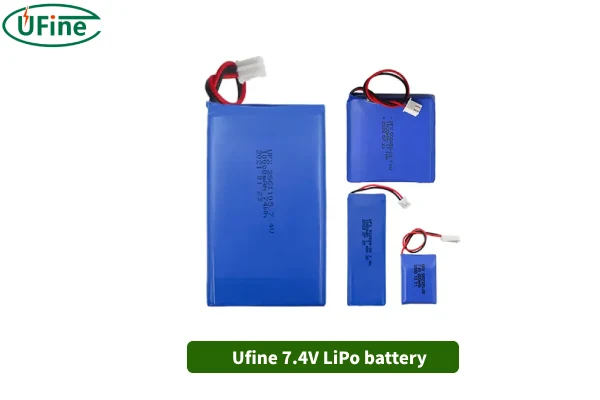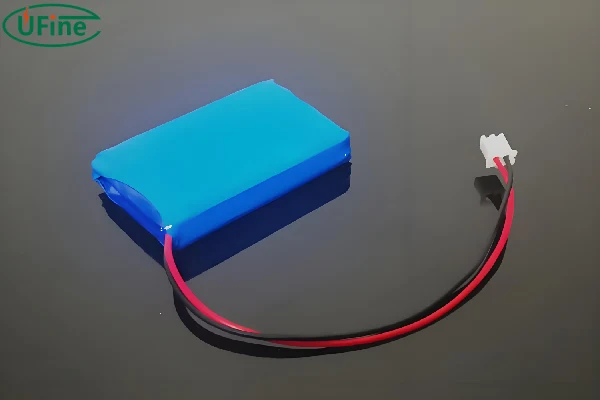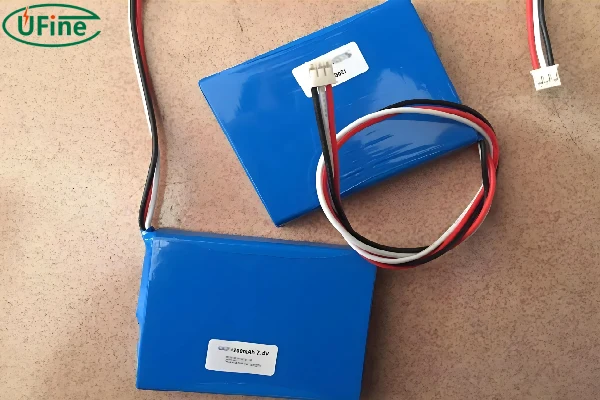If you’ve ever tinkered with RC cars, drones, or other hobby electronics, you’ve likely come across 7.4V LiPo batteries. These batteries are incredibly popular in the world of high-performance gadgets. But what makes them so special? In this article, we’ll dive into what 7.4V LiPo batteries are and why they’re so widely used. We will cover everything from their structure to their applications, prices, and more. Let’s get started!
Part 1. What is a 7.4V LiPo battery?
A 7.4V LiPo battery, also known as a 2S LiPo battery or a 7.4V LiPo battery pack, is a type of lithium polymer battery. The “7.4V” part of the name refers to the voltage, which is a combination of the individual cells inside the battery. Each cell in a LiPo battery typically has a nominal voltage of 3.7V. When two cells are connected in series (hence, “2S”), their voltages add up to 7.4V.
But why LiPo? LiPo batteries are known for their lightweight, high energy density, and flexibility in shape and size. Unlike traditional cylindrical batteries, LiPo batteries can be made in thin, flat shapes, which is perfect for fitting into compact devices. They also have a high discharge rate, meaning they can provide a lot of power quickly, which is essential for high-performance applications.
Characteristics of 7.4V LiPo Batteries
- High Energy Density: They store a lot of energy in a small package.
- Lightweight: Perfect for applications where weight is a concern.
- Flexible Shapes: These can be made into various shapes and sizes.
- High Discharge Rate: Provides a lot of power quickly.
- Rechargeable: Can be recharged and used multiple times.
Part 2. How many cells does a 7.4V LiPo battery have?
As mentioned earlier, a 7.4V LiPo battery pack consists of two cells connected in series. Each cell has a nominal voltage of 3.7V, adding up to a total of 7.4V. This 2-cell configuration is often referred to as “2S”. The “S” stands for series, indicating how the cells are connected.
Part 3. Capacity
The capacity of a 7.4V LiPo battery is measured in milliampere-hours (mAh). This indicates how much charge the battery can hold. Common capacities for 7.4V LiPo batteries include:
- 500mAh to 1000mAh: Suitable for small gadgets and lightweight applications.
- 1000mAh to 2000mAh: Common in medium-sized devices like drones and RC cars.
- 2000mAh to 5000mAh: Used in larger, more power-hungry devices.
Part 4. Applications
7.4V LiPo batteries are used in a wide range of applications due to their high energy density and lightweight nature. Here are some common uses:
- RC Cars and Drones: Provides the high power needed for fast speeds and long flight times.
- Portable Electronics: Used in devices like portable speakers and handheld gaming consoles.
- Model Airplanes and Helicopters: These are essential for providing the power necessary for flight.
- Robotics: Powers various types of robots, from hobbyist kits to more advanced designs.
- Camera Equipment: Often used in gimbals and other camera stabilization tools.
Part 5. Price
The price of 7.4V LiPo batteries can vary based on their capacity, brand, and quality. Here’s a general idea of what you might expect:
- 500mAh to 1000mAh: $10 to $20
- 1000mAh to 2000mAh: $20 to $30
- 2000mAh to 5000mAh: $30 to $80
Prices can fluctuate based on where you buy them and whether you purchase them in bulk.
Part 6. Chargers
Charging your 7.4V LiPo battery correctly is crucial for its longevity and safety. Here are some common types of chargers:
- Basic Chargers: Simple and affordable, but may lack advanced features.
- Balance Chargers: Ensure each cell in the battery is charged equally, which is important for maintaining battery health.
- Smart Chargers: These come with safety features like overcharge protection and temperature monitoring.
- USB Chargers: These are convenient for small batteries and can be plugged into USB ports for easy charging.
Part 7. 7.4V LiPo battery charging time
The time it takes to charge a 7.4V LiPo battery depends on the charger and the battery’s capacity. On average:
- 500mAh to 1000mAh: About 1 to 2 hours
- 1000mAh to 2000mAh: About 2 to 3 hours
- 2000mAh to 5000mAh: About 3 to 5 hours
Part 8. How to charge a 2S 7.4V LiPo battery?
Charging a 2S 7.4V LiPo battery is straightforward, but it’s essential to do it correctly:
- Choose the Right Charger: Ensure you use a charger designed for LiPo batteries, ideally a balanced charger.
- Connect the Battery: Plug the battery into the charger, making sure the connections are secure.
- Monitor the Charge: Keep an eye on the charging process. Most chargers have indicators to show when the battery is fully charged.
- Avoid Overcharging: Disconnect the battery once it’s fully charged to prevent damage.
Part 9. How long does a 7.4V LiPo battery last?
The lifespan of a 7.4V LiPo battery depends on how it’s used and maintained. Generally, these batteries last between 300 to 500 charge cycles. Proper care can extend their life:
- Avoid Deep Discharges: Don’t let the battery discharge completely.
- Store Properly: Keep the battery in a cool, dry place.
- Use the Right Charger: Always use a charger designed for LiPo batteries.
Part 10. 7.4V LiPo battery manufacturers
When it comes to reliable 7.4V LiPo batteries, one notable manufacturer is Ufine Battery. Based in China, Ufine Battery specializes in custom lithium batteries. They can customize 7.4V LiPo batteries in various sizes and capacities to meet your specific needs. Known for its high-quality products and excellent customer service, Ufine Battery is a trusted name in the industry.
Related Tags:
More Articles

How to Choose the Best Floor Scrubber Battery for Commercial Cleaning?
Selecting the ideal floor scrubber battery ensures a long runtime, rapid charging, and minimal maintenance for efficient commercial cleaning operations.
Battery for Blower vs Battery for Leaf Vacuum: Which One Should You Choose?
Battery for blower vs leaf vacuum—learn the key differences in power, fit, and runtime to choose the right battery for your outdoor tool needs.
How to Choose the Right Battery for Blower?
Choosing the right blower battery? Consider voltage, capacity, chemistry & usage. This guide helps match the best battery for peak performance.
How to Choose the Best Insulated Battery Box for Lithium Batteries?
Choosing the Best Insulated Battery Box for Lithium Batteries? Discover key factors such as size, material, and safety for optimal protection and performance.
7 Critical Elements on a Lithium Battery Shipping Label
What must be on a lithium battery shipping label? Learn 7 key elements to ensure safety, legal compliance, and correct handling across all transport modes.






